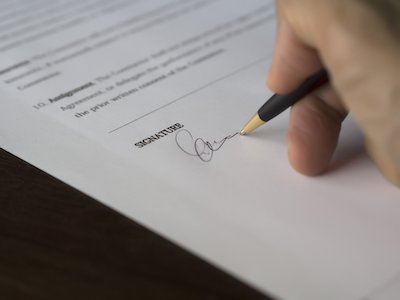
19 May Can I Correct My Deposition? Complete Guide
Despite extensive preparation and practice, mistakes during your deposition may happen. In the stress of the moment, you may share information during your deposition that is simply not correct. Luckily, you may have the ability to correct your errors to ensure your deposition is truthful and accurate.
Can I correct my deposition? Yes! In most cases, you will be able to make corrections to the deposition transcript within the 30 days following its completion. If you realize your error during the actual deposition, you may be able to correct your mistake before the deposition is even complete. There are benefits to having this ability. However, there are also reasons why deposition corrections are not advised.
As with any situation, your attorney will be able to provide you with greater insight into how this benefits your unique situation. Keep reading to learn more about how to correct your deposition as well as the various advantages and disadvantages of doing so.
Correcting Your Deposition
When you participate in a legal deposition, you are sworn in under an oath. This oath states that you will answer the questions truthfully to the best of your ability. However, whether due to stress, anxiety, or simply forgetfulness, you may fail to provide the correct answer to a question.
In the event that you realize you answered a question incorrectly, or remember other details that you should have included in your answer, you may be able to submit corrections to the deposition.
Making Corrections During the Deposition
Throughout the course of your deposition, you may realize that you provided false information or failed to answer a question truthfully. If this happens, it is important to correct yourself as soon as possible. Simply state that you remembered additional information for a previous question. Restate the question and then clearly correct your original statement.
Be careful to do so in a way that is not confusing as this can complicate the deposition and confuse the jury if your deposition is read during the courtroom trial.
Making Corrections After the Deposition
 In many cases, you will not realize that you made an error during your deposition until after the deposition is complete. Although this may be discouraging, and often stressful, there is a way to correct your deposition transcript after it is complete.
In many cases, you will not realize that you made an error during your deposition until after the deposition is complete. Although this may be discouraging, and often stressful, there is a way to correct your deposition transcript after it is complete.
As stated in Federal Rules of Civil Procedure 30(e), a deponent is permitted to make changes to their deposition transcription or recording for 30 days following its release. Upon careful review of the transcript or recording, the deponent must sign a statement that clearly lists any changes and outlines the need for the changes to be made.
Your personal injury attorney will be the one to notify you that your deposition is available for review. At this point, you will decide if a complete review is necessary and if there are any changes that you should make. In most cases, it is beneficial for the deponent to carefully review the deposition, even if they are confident that there are no corrections to be made.
Upon your submission of a statement outlining changes to your deposition, the defending attorney will review the changes you have made. They will determine if the changes would impact the final outcome of the case by altering your statement or if they are simply typography errors.
Each jurisdiction has a unique approach to how they handle the submission of changes to depositions. Depending on the type of corrections you have submitted, and the stance of the defense attorney in the case, your deposition may be reopened. This allows you to correct your original statement. If the corrections you submitted are of little consequence to the case, the defending attorney may move to strike the corrections made from the original deposition transcription.
Benefits of Correcting a Deposition
There are many benefits to having the ability to correct your deposition after it is complete. And there are many reasons why you should consider submitting corrections to your deposition if you failed to provide accurate answers or a thorough statement.
If the case is going to move onto a courtroom trial, it is important that the deposition reflects the information that is shared during the trial. You will be sworn in under an oath in the courtroom. Because of this, it is best to correct your deposition prior to the trial to avoid any inconsistencies between your testimony and the one you gave previously during the deposition.
Perhaps you answered a deposition question truthfully but failed to remember key details at the moment. Making corrections to include these crucial details once they come to mind allows you to answer the question in greater detail.
A lawyer can (and likely will) use any information you share during a deposition against you. For this reason, it is wise to correct any errors in your initial deposition. Failing to make these crucial corrections could have negative implications on the outcome of your trial.
Why You Shouldn’t Correct Your Deposition
While there are many reasons it is beneficial to correct your deposition, there are also a few ways that it can cause more harm than good. Here are a few of the reasons why making corrections to your deposition may reflect poorly on your testimony and character.
Of course, you must always determine whether the advantages of making corrections outweigh the disadvantages.
Corrections May Open You Up for Attack
The most prominent disadvantage to correcting your deposition is that it will likely open you up for attack during the trial. When you make corrections to your deposition, it is easy for the opposing party to attack the credibility of your testimony as a whole. Unfortunately, they can use the fact that you made corrections as justification for their belief that you are not trustworthy.
You May Miss a Correction
Correcting a deposition is a very intense and important matter. It is nearly impossible to catch every single mistake and flaw in a deposition. If you review and correct the deposition, you are essentially signing off that the deposition is correct in every aspect.
When you miss a correction, even one that is insignificant, it may appear that you did not do your job thoroughly. This reflects poorly on your intent behind the corrections, even if you missed the correction inadvertently.
Tips for a Successful Deposition
Of course, the best way to avoid making corrections to your deposition is to have a successful deposition! The most important aspect of a successful deposition is ensuring that you prepare properly. Listed below are a few of the ways that you can prepare for your upcoming deposition.
Review Possible Questions
Your personal injury lawyer will be able to provide you with a list of possible deposition questions. You should not memorize your answers to these questions. However, it is wise to review the information thoroughly leading up to the event.
Reviewing your answers for questions can bring crucial information to mind. This leaves less possibility for errors on the day of the deposition. You can find some other common deposition questions here.
Think Through Every Answer
Perhaps the best way to avoid the need for corrections during your deposition is to carefully think through every answer. Listen to each question asked by the opposing lawyer, asking for clarification when needing. Remember that you are not on a stopwatch during your deposition. Take your time to listen to each question and think through your entire answer before you begin to speak.
This will not only allow you to provide clear, concise answers but it will also enable you to maintain your composure and professional demeanor during the deposition.
Beware of Complex Questions
A common tactic of lawyers during a deposition is the use of complex questions. With this tactic, they will lump two questions together as one in order to trick you into providing false information. An example of a complex question would be, “Were you driving to work and did you run the red light?”. While you were driving to work, you did not run the red light.
If the opposing lawyer poses a complex question, it is always best to ask them to rephrase the questions one at a time. Doing so will allow you to answer each question with an appropriate answer.
Any level of involvement in a legal deposition can become stressful. The information you share during a deposition can have such a large impact on the outcome of the case. Because of this, it is important to provide the truth. This may require you to make corrections to your deposition once the transcript is released.
It is important to provide the truth during a deposition. However, you must also weigh the pros and cons of making corrections. In some cases, making corrections to your deposition may negatively impact the outcome of the case.
If you believe you have answered a question during your deposition inaccurately, it is best to contact your lawyer immediately. They will be able to offer counsel and advice on how to continue.
Find more valuable Deposition Tips & Training here.





